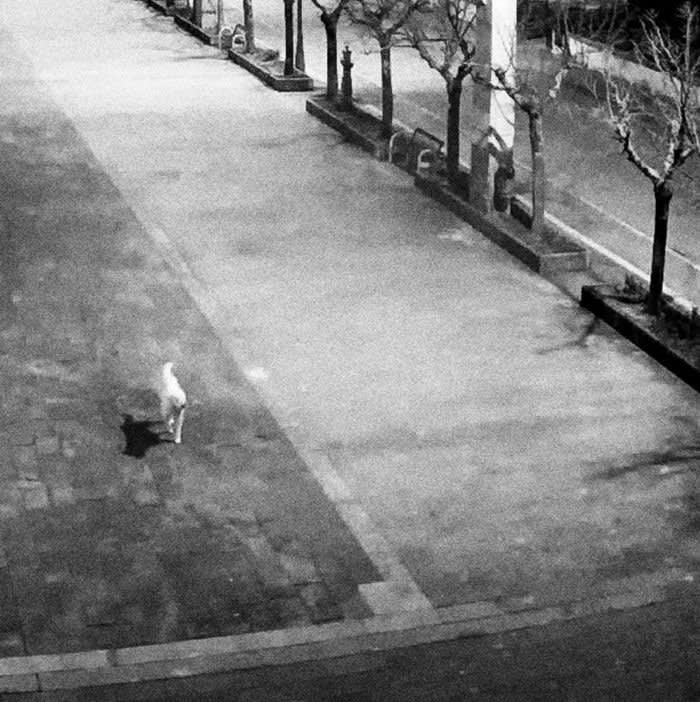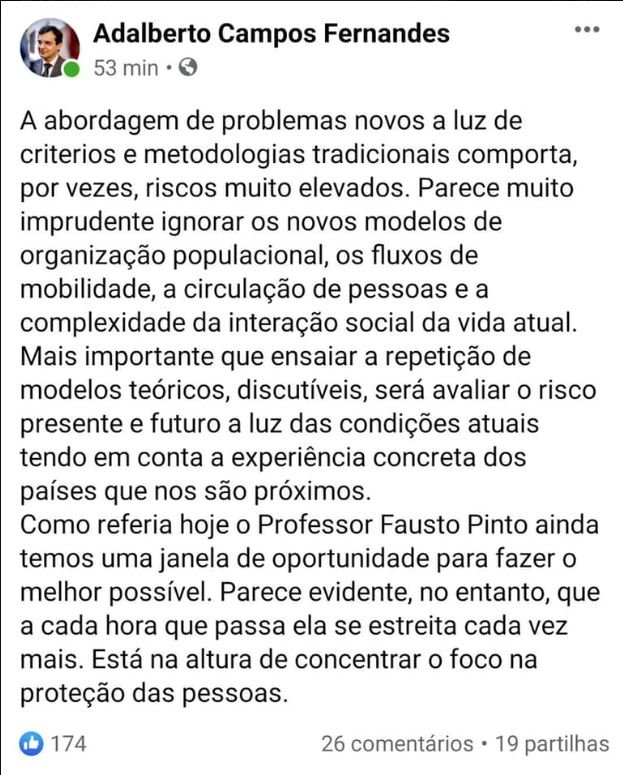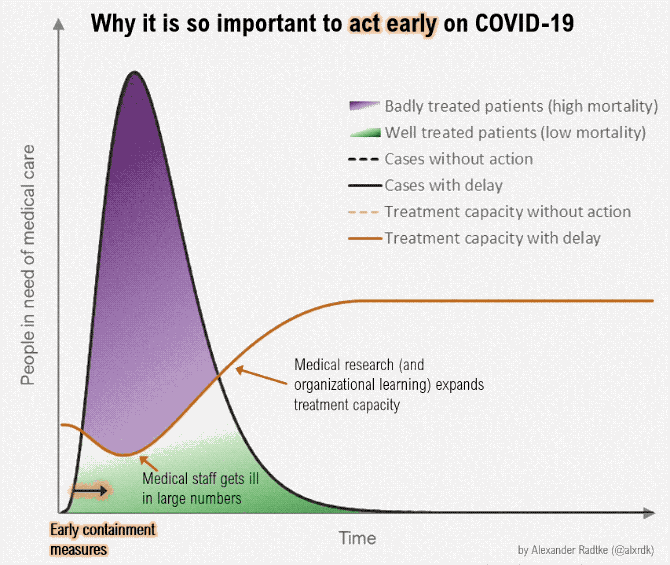Yuval Noah Harari: the world after coronavirus
This storm will pass. But the choices we make now could change our lives for years to come
Yuval Noah Harari MARCH 20 2020 -FT
Humankind is now facing a global crisis. Perhaps the biggest crisis of our generation. The decisions people and governments take in the next few weeks will probably shape the world for years to come. They will shape not just our healthcare systems but also our economy, politics and culture. We must act quickly and decisively. We should also take into account the long-term consequences of our actions. When choosing between alternatives, we should ask ourselves not only how to overcome the immediate threat, but also what kind of world we will inhabit once the storm passes. Yes, the storm will pass, humankind will survive, most of us will still be alive — but we will inhabit a different world.
Many short-term emergency measures will become a fixture of life. That is the nature of emergencies. They fast-forward historical processes. Decisions that in normal times could take years of deliberation are passed in a matter of hours. Immature and even dangerous technologies are pressed into service, because the risks of doing nothing are bigger. Entire countries serve as guinea-pigs in large-scale social experiments. What happens when everybody works from home and communicates only at a distance? What happens when entire schools and universities go online? In normal times, governments, businesses and educational boards would never agree to conduct such experiments. But these aren’t normal times. In this time of crisis, we face two particularly important choices. The first is between totalitarian surveillance and citizen empowerment. The second is between nationalist isolation and global solidarity.
Under-the-skin surveillance
In order to stop the epidemic, entire populations need to comply with certain guidelines. There are two main ways of achieving this. One method is for the government to monitor people, and punish those who break the rules. Today, for the first time in human history, technology makes it possible to monitor everyone all the time. Fifty years ago, the KGB couldn’t follow 240m Soviet citizens 24 hours a day, nor could the KGB hope to effectively process all the information gathered. The KGB relied on human agents and analysts, and it just couldn’t place a human agent to follow every citizen. But now governments can rely on ubiquitous sensors and powerful algorithms instead of flesh-and-blood spooks.
Piazza Beato Roberto in Pescara © Graziano Panfili
( About the photography - The images accompanying this article are taken from webcams overlooking the deserted streets of Italy, found and manipulated by Graziano Panfili, a photographer living under lockdown.)
In their battle against the coronavirus epidemic several governments have already deployed the new surveillance tools. The most notable case is China. By closely monitoring people’s smartphones, making use of hundreds of millions of face-recognising cameras, and obliging people to check and report their body temperature and medical condition, the Chinese authorities can not only quickly identify suspected coronavirus carriers, but also track their movements and identify anyone they came into contact with. A range of mobile apps warn citizens about their proximity to infected patients.
This kind of technology is not limited to east Asia. Prime Minister Benjamin Netanyahu of Israel recently authorised the Israel Security Agency to deploy surveillance technology normally reserved for battling terrorists to track coronavirus patients. When the relevant parliamentary subcommittee refused to authorise the measure, Netanyahu rammed it through with an “emergency decree”.
You might argue that there is nothing new about all this. In recent years both governments and corporations have been using ever more sophisticated technologies to track, monitor and manipulate people. Yet if we are not careful, the epidemic might nevertheless mark an important watershed in the history of surveillance. Not only because it might normalise the deployment of mass surveillance tools in countries that have so far rejected them, but even more so because it signifies a dramatic transition from “over the skin” to “under the skin” surveillance.
Hitherto, when your finger touched the screen of your smartphone and clicked on a link, the government wanted to know what exactly your finger was clicking on. But with coronavirus, the focus of interest shifts. Now the government wants to know the temperature of your finger and the blood-pressure under its skin.
The emergency pudding
One of the problems we face in working out where we stand on surveillance is that none of us know exactly how we are being surveilled, and what the coming years might bring. Surveillance technology is developing at breakneck speed, and what seemed science-fiction 10 years ago is today old news. As a thought experiment, consider a hypothetical government that demands that every citizen wears a biometric bracelet that monitors body temperature and heart-rate 24 hours a day. The resulting data is hoarded and analysed by government algorithms. The algorithms will know that you are sick even before you know it, and they will also know where you have been, and who you have met. The chains of infection could be drastically shortened, and even cut altogether. Such a system could arguably stop the epidemic in its tracks within days. Sounds wonderful, right?
The downside is, of course, that this would give legitimacy to a terrifying new surveillance system. If you know, for example, that I clicked on a Fox News link rather than a CNN link, that can teach you something about my political views and perhaps even my personality. But if you can monitor what happens to my body temperature, blood pressure and heart-rate as I watch the video clip, you can learn what makes me laugh, what makes me cry, and what makes me really, really angry.
It is crucial to remember that anger, joy, boredom and love are biological phenomena just like fever and a cough. The same technology that identifies coughs could also identify laughs. If corporations and governments start harvesting our biometric data en masse, they can get to know us far better than we know ourselves, and they can then not just predict our feelings but also manipulate our feelings and sell us anything they want — be it a product or a politician. Biometric monitoring would make Cambridge Analytica’s data hacking tactics look like something from the Stone Age. Imagine North Korea in 2030, when every citizen has to wear a biometric bracelet 24 hours a day. If you listen to a speech by the Great Leader and the bracelet picks up the tell-tale signs of anger, you are done for.

Veduta della Casa Universitaria in Lodi © Graziano Panfili
Spiaggia di Porto San Giorgio, Mare Adriatico © Graziano Panfili
You could, of course, make the case for biometric surveillance as a temporary measure taken during a state of emergency. It would go away once the emergency is over. But temporary measures have a nasty habit of outlasting emergencies, especially as there is always a new emergency lurking on the horizon. My home country of Israel, for example, declared a state of emergency during its 1948 War of Independence, which justified a range of temporary measures from press censorship and land confiscation to special regulations for making pudding (I kid you not). The War of Independence has long been won, but Israel never declared the emergency over, and has failed to abolish many of the “temporary” measures of 1948 (the emergency pudding decree was mercifully abolished in 2011).
Even when infections from coronavirus are down to zero, some data-hungry governments could argue they needed to keep the biometric surveillance systems in place because they fear a second wave of coronavirus, or because there is a new Ebola strain evolving in central Africa, or because . . . you get the idea. A big battle has been raging in recent years over our privacy. The coronavirus crisis could be the battle’s tipping point. For when people are given a choice between privacy and health, they will usually choose health.
The soap police Asking people to choose between privacy and health is, in fact, the very root of the problem. Because this is a false choice. We can and should enjoy both privacy and health. We can choose to protect our health and stop the coronavirus epidemic not by instituting totalitarian surveillance regimes, but rather by empowering citizens. In recent weeks, some of the most successful efforts to contain the coronavirus epidemic were orchestrated by South Korea, Taiwan and Singapore. While these countries have made some use of tracking applications, they have relied far more on extensive testing, on honest reporting, and on the willing co-operation of a well-informed public.
Centralised monitoring and harsh punishments aren’t the only way to make people comply with beneficial guidelines. When people are told the scientific facts, and when people trust public authorities to tell them these facts, citizens can do the right thing even without a Big Brother watching over their shoulders. A self-motivated and well-informed population is usually far more powerful and effective than a policed, ignorant population.
Consider, for example, washing your hands with soap. This has been one of the greatest advances ever in human hygiene. This simple action saves millions of lives every year. While we take it for granted, it was only in the 19th century that scientists discovered the importance of washing hands with soap. Previously, even doctors and nurses proceeded from one surgical operation to the next without washing their hands. Today billions of people daily wash their hands, not because they are afraid of the soap police, but rather because they understand the facts. I wash my hands with soap because I have heard of viruses and bacteria, I understand that these tiny organisms cause diseases, and I know that soap can remove them.

The Royal Palace of Caserta © Graziano Panfili

Lungomare di Forte dei Marmi, in Versilia © Graziano Panfili
Please use the sharing tools found via the share button at the top or side of articles. Copying articles to share with others is a breach of
FT.com T&Cs and
Copyright Policy. Email
licensing@ft.com to buy additional rights. Subscribers may share up to 10 or 20 articles per month using the gift article service. More information can be
found here.
https://www.ft.com/content/19d90308-6858-11ea-a3c9-1fe6fedcca75
But to achieve such a level of compliance and co-operation, you need trust. People need to trust science, to trust public authorities, and to trust the media. Over the past few years, irresponsible politicians have deliberately undermined trust in science, in public authorities and in the media. Now these same irresponsible politicians might be tempted to take the high road to authoritarianism, arguing that you just cannot trust the public to do the right thing.
Normally, trust that has been eroded for years cannot be rebuilt overnight. But these are not normal times. In a moment of crisis, minds too can change quickly. You can have bitter arguments with your siblings for years, but when some emergency occurs, you suddenly discover a hidden reservoir of trust and amity, and you rush to help one another. Instead of building a surveillance regime, it is not too late to rebuild people’s trust in science, in public authorities and in the media. We should definitely make use of new technologies too, but these technologies should empower citizens. I am all in favour of monitoring my body temperature and blood pressure, but that data should not be used to create an all-powerful government. Rather, that data should enable me to make more informed personal choices, and also to hold government accountable for its decisions.
If I could track my own medical condition 24 hours a day, I would learn not only whether I have become a health hazard to other people, but also which habits contribute to my health. And if I could access and analyse reliable statistics on the spread of coronavirus, I would be able to judge whether the government is telling me the truth and whether it is adopting the right policies to combat the epidemic. Whenever people talk about surveillance, remember that the same surveillance technology can usually be used not only by governments to monitor individuals — but also by individuals to monitor governments.
The coronavirus epidemic is thus a major test of citizenship. In the days ahead, each one of us should choose to trust scientific data and healthcare experts over unfounded conspiracy theories and self-serving politicians. If we fail to make the right choice, we might find ourselves signing away our most precious freedoms, thinking that this is the only way to safeguard our health.
We need a global plan The second important choice we confront is between nationalist isolation and global solidarity. Both the epidemic itself and the resulting economic crisis are global problems. They can be solved effectively only by global co-operation. First and foremost, in order to defeat the virus we need to share information globally. That’s the big advantage of humans over viruses. A coronavirus in China and a coronavirus in the US cannot swap tips about how to infect humans. But China can teach the US many valuable lessons about coronavirus and how to deal with it. What an Italian doctor discovers in Milan in the early morning might well save lives in Tehran by evening. When the UK government hesitates between several policies, it can get advice from the Koreans who have already faced a similar dilemma a month ago. But for this to happen, we need a spirit of global co-operation and trust.
Countries should be willing to share information openly and humbly seek advice, and should be able to trust the data and the insights they receive. We also need a global effort to produce and distribute medical equipment, most notably testing kits and respiratory machines. Instead of every country trying to do it locally and hoarding whatever equipment it can get, a co-ordinated global effort could greatly accelerate production and make sure life-saving equipment is distributed more fairly. Just as countries nationalise key industries during a war, the human war against coronavirus may require us to “humanise” the crucial production lines. A rich country with few coronavirus cases should be willing to send precious equipment to a poorer country with many cases, trusting that if and when it subsequently needs help, other countries will come to its assistance.
We might consider a similar global effort to pool medical personnel. Countries currently less affected could send medical staff to the worst-hit regions of the world, both in order to help them in their hour of need, and in order to gain valuable experience. If later on the focus of the epidemic shifts, help could start flowing in the opposite direction.
Global co-operation is vitally needed on the economic front too. Given the global nature of the economy and of supply chains, if each government does its own thing in complete disregard of the others, the result will be chaos and a deepening crisis. We need a global plan of action, and we need it fast.

The Duomo in Florence © Graziano Panfili

Torre San Giovanni, in Lecce © Graziano Panfili
Unfortunately, at present countries hardly do any of these things. A collective paralysis has gripped the international community. There seem to be no adults in the room. One would have expected to see already weeks ago an emergency meeting of global leaders to come up with a common plan of action. The G7 leaders managed to organise a videoconference only this week, and it did not result in any such plan.
In previous global crises — such as the 2008 financial crisis and the 2014 Ebola epidemic — the US assumed the role of global leader. But the current US administration has abdicated the job of leader. It has made it very clear that it cares about the greatness of America far more than about the future of humanity.
This administration has abandoned even its closest allies. When it banned all travel from the EU, it didn’t bother to give the EU so much as an advance notice — let alone consult with the EU about that drastic measure. It has scandalised Germany by allegedly offering $1bn to a German pharmaceutical company to buy monopoly rights to a new Covid-19 vaccine. Even if the current administration eventually changes tack and comes up with a global plan of action, few would follow a leader who never takes responsibility, who never admits mistakes, and who routinely takes all the credit for himself while leaving all the blame to others.
If the void left by the US isn’t filled by other countries, not only will it be much harder to stop the current epidemic, but its legacy will continue to poison international relations for years to come. Yet every crisis is also an opportunity. We must hope that the current epidemic will help humankind realise the acute danger posed by global disunity.
Humanity needs to make a choice. Will we travel down the route of disunity, or will we adopt the path of global solidarity? If we choose disunity, this will not only prolong the crisis, but will probably result in even worse catastrophes in the future. If we choose global solidarity, it will be a victory not only against the coronavirus, but against all future epidemics and crises that might assail humankind in the 21st century.
Yuval Noah Harari is author of ‘Sapiens’, ‘Homo Deus’ and ‘21 Lessons for the 21st Century’



 The Colosseum in Rome
The Colosseum in Rome

















